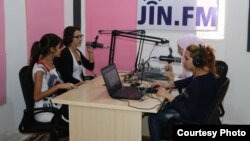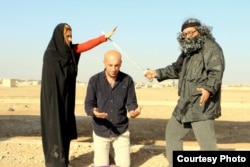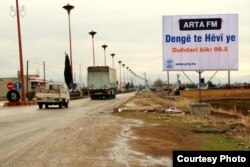Syrian Kurds are using newfound media freedoms to combat the Islamic State group.
More than a dozen new radio stations that vary from independent to partisan have been established, and the broadcasters' main focus has been exposing terror and propaganda from IS militants in Syria.
“They [IS members] live to die, but we love life,” said Siruan Hadsch Hossein, founder of the Arta FM radio station. “That’s why we constantly focus on IS crimes in our news and broadcasting.”
Prior to the popular uprising against the regime of Syrian President Bashar al-Assad in 2011, broadcasting in Syria was centralized through state-run media.
Now, residents here get their news about the Syrian civil war through their local radio stations. And the war isn't far away: Despite the relative calm in Amude, part of the Kurdish heartland, fighting between YPG Kurdish forces and IS militants is raging a few kilometers to the south.
With mostly amateur staff, the radio stations strive to be heard inside every household in this region.
Broadcaster Hossein, who said his station is mostly funded by a U.S. State Department program, uses the airwaves creatively, with programs ranging from hard news to satires about IS.
The broadcasts seem to be a hit with listeners.
“No matter what your background is, you ought to believe that Daesh [IS] acts are inhumane,” said an elderly man who had his portable radio close to one ear while sitting outside his house.
His son said that throughout the day he is “listening to the news of the war.”
Broadcasters, noting that they are living in a diverse region, say they attempt to promote ideas of acceptance and tolerance among different religious and ethnic groups.
“We bring Islamic scholars to expose IS ideology on air,” Hossein said, “But this is not only about Muslims and Islam. We also host Yazidi and Christian religious scholars [who] talk about their own religions.”
One listener, a woman who wore a hijab, told VOA that IS and its ideology were alien to the local population.
“I’m Muslim and I think what Daesh does is un-Islamic,” she said. “I’m really happy that Kurdish media is showing that.”
The programming reflects what the audience wants, broadcasters said.
“This is a secular society that embraces diversity and eschews all types of religious extremism. We only reflect what our Kurdish society stands for,” said Anwar Naso, head of the Amude FM radio station.
“It’s natural for us as a media outlet to counter Daesh, the al-Nusra [rebel front] and any other extremist group in Syria,” he said.
But the broadcasters admit that when it comes to IS, they are biased.
“We try our best to remain professional, but given what’s happening here, it is hard to be neutral,” Naso told VOA. “You have to take sides.”






